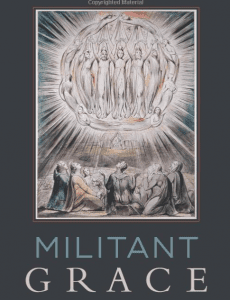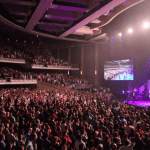 What does it mean to pray that “thy kingdom come”? We are looking at Philip Ziegler, Militant Grace: The Apocalyptic Turn and the Future of Christian Theology.
What does it mean to pray that “thy kingdom come”? We are looking at Philip Ziegler, Militant Grace: The Apocalyptic Turn and the Future of Christian Theology.
It is eschatological, it is theological, and it is christological, and opens with theological abstraction that becomes more clear as the chapter proceeds:
In short, I suggest that praying “Thy Kingdom Come’ faithfully means inhabiting an eschatological field shaped decisively by both christological and apocalyptic coordinates, and that petitioning God in just this way is properly constitutive of the very fundaments of Christian faith.
This helps clarify his “coordinates”: it is about an act of God.
To pray for the coming of the Kingdom is to beg that God would come upon the world as God. For God to do so would end its illegitimate and vicious usurpation by the powers of sin and death, making the whole of creation coextensive with the sphere of his rightful, effective, and salutary lordship.
The petition calls upon God to “remember” his own righteousness and invites the Lord to do that which only the Lord can do: to justify himself by realizing his promise to reign.
An act of God in time that makes it eschatological/apocalyptic but this next quotation shows that kingdom is tied intimately to christology, what Origen called the “autobasileia” (Christ is the kingdom itself). This is a very important point about kingdom theology, something that social gospelers and liberationists sometimes ignore or diminish:
So strong is the link between Christ and the Kingdom in the early Christian imagination that it becomes possible, even necessary, to construe the eschatological advent of the Kingdom of God exclusively in terms of Christ’s own apocalyptic parousia. … The decisive meaning of the petition ‘Thy Kingdom Come” is to be found in its intimate material proximity to the apocalyptic prayer “Come, Lord Jesus” (1 Cor. 16:22; Rev. 22:20).
Ziegler turns to Calvin and then to Barth. Here’s Calvin twofold emphasis (redemption of God’s people, destruction of the evil and evil):
Calvin’s own Geneva Catechism (1541) teaches that the Kingdom of God principally consists in the governance of the faithful by the Spirit together with the confutation of the rebellious reprobate in a simultaneous expression of divine mercy and divine power.
These brief teaching articles have behind them Calvin’s discussion of the matter in the early editions of his Institutes of the Christian Religion. There he ascribes to the petition a threefold sense: first, as prayer for the ingathering of believers and their receipt of the Lord’s grace, which deepens “their perfect union with himself”; second, as prayer for God’s “light and truth” to dispel the “darkness and falsehoods of Satan and his kingdom”; and third, as prayer for the glorious fulfillment of all this “in the revelation of [God’s] judgement” and final defeat of all his enemies (citing 1 Cor. 15:28).
The one praying is implicated in the prayer itself:
As Calvin’s account makes patent, the person who petitions for the coming of the Kingdom is decisively implicated in an eschatological contest in which individual, church, and world are all ultimately at stake.
Now Barth, whose “realized” eschatology (=apocalyptic theology) comes to the fore:
It is highly significant that Barth explicitly sets out from the judgment that the Reformers themselves did not adequately grasp the properly eschatological character of the Kingdom.
Barth’s first exposition leads with a fully eschatological definition of the Kingdom as God’s “effective and appointed defence” of humanity and victory over sin; as such it is equivalent to the reconciliation of the world wi th God; it is the enactment of God’s own righteousness, his sovereign realization of the world’s “destiny and purpose,” which sees all creaturely reality ultimately “enfolded by the peace of God.” From this definition, two crucial things follow. First, the coming of the Kingdom can only be something for which we pray since it infinitely exceeds both our imagination to conceive and our power to achieve. … Second, and no less crucially for Barth, God has already established his Kingdom in and through Jesus Christ.
Because to pray for the coming of the Kingdom means to ask God to make the hidden truth of this already manifest even now, to “remove the covering,’ to lift “the veil behind which reality lies,” to make visible to sight what is currently invisible and grasped only by faith.37 In short, Barth explains, the petition must be understood as a plea to disclose to plain sight the Kingdom that has already come.
He pins Barth to Calvin in some ways:
… b0th Reformed theologians discern that to pray “Thy Kingdom come” is to be drawn into God’s own struggle to extend the good and salutary order of his gracious reign across the contours of a damnably inhumane and unruly world.
Ziegler draws this into the praxis of praying the Thy Kingdom Come prayer:
First, the very possibility of taking the second petition of the Lord’s Prayer as our own resides fully in the gift of the Lord and nowhere besides: it is only as those saved, summoned, and commanded by Christ the Eschatos that we may genuinely pray for the eschaton.
Second, coming as it does from the hand of Christ, the mainspring of the prayer for the Kingdom is the plenitude of the gospel.
Third, the prayer draws the supplicant into an agonistic situation of spiritual and moral struggle.












